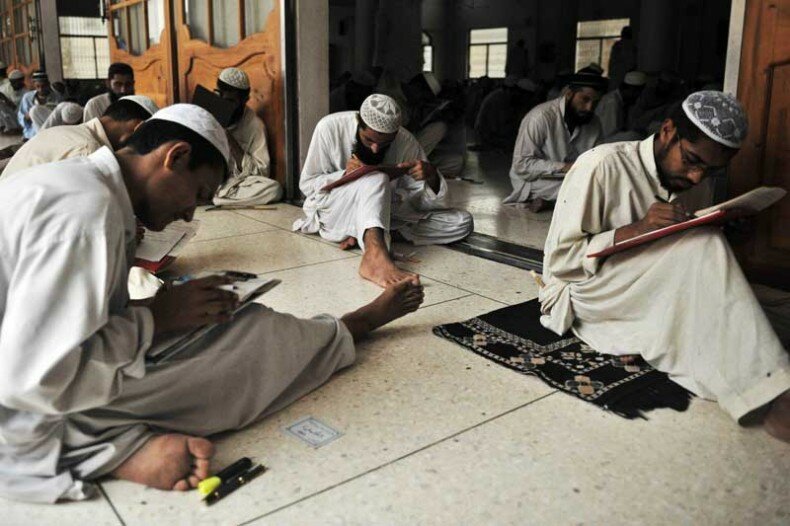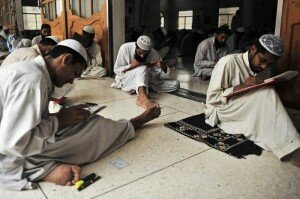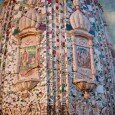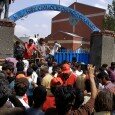By Yasir Habib Khan –
Along all other crucial steps, the federal and provincial governments must also not hesitate in reforming and regulating Deni Madaris to root out extremism and militancy from Pakistan
Government is in catch-22 situation on putting the hand in the hornet’s nest of Madaris (religious seminaries) — a key reason identified in fueling terrorism and predominantly diagnosed by National Action Plan Committee under the headship of Prime Minister Nawaz Sharif which resolved to lead ultimate war against terrorists.
Belated woke up after Peshawar carnage, PML-N regime with the strong backing of most of senators and parliamentarians even National Counter Terrorism Authority (NECTA) intends to reform Madaris through auditing their funds, enforcing extensive regulation and clamping down unregistered Madaris as an integral step to terminate ingrained extremism but freaks out to do so anticipating religious backlash at the hands of hard-line clergy.
In wake of just slight eagerness by government on Madaris reform and action against those Deni institutions netted with terrorist organizations, clerics seem to have rolled up their sleeves to take on government.
JUI-S head Maulana Sami ul Haq warns of mobilizing religious power if government plans to hit the Madaris. “Government better to inform us about unwanted elements and we will decide what to do with them. If unilateral action is triggered, country would plunge into anarchy,” he pledged. Another religious scholar Maulana Abdul Ghafoor Haideri lashed out at government for unleashing undue raids on religious seminaries. Government had to, he said, nab culprits but it had launched operation to harass thousands students of Madaris.
Wafaq ul Madaris secretary general Qari Hafiz Jalandri appreciated government measures to reform Madaris. “We never opposed registration of Madaris rather local administration officials throw the spanner in the work. Even some banks deny opening of banks accounts of Madaris,” he added. However, he complained rulers for alleging fund raising by religious seminaries, saying madaris were brought in cross hair but nobody talked about NGOs involved in collecting funds to perform their ulterior designs.
The madrassas have gradual growth since independence when they numbered some 245. Now Pakistan houses more than 21000 registered Madaris with 14956 in Punjab, 4490 in Sindh, 1420 in Khyber Pakhtoon Khawa and 1341 in Balochistan. However, they are not registered under any government authority instead through their own bodies (called Wafaq or system of Madaris Boards).
The system of Madaris Boards includes Wafaqul Madaris (Deobandi), Tanzimul Madaris (Barelvi), Wafaqul Madaris Pakistan (Shia), Rabtatul Madaris Al Islamia (Jamaat-e-Islami) and Wafaqul Madaris Al Salafia (Ahle Hadith). These Wafaqs design complete syllabus and curriculum of all Madaris registered with them. The five Madaris boards formed its own independent regulatory authority called the Ittehad e Tanzeemat Madaris e Deeniya (ITMD), or “the federation of madrassa boards”.
As per report of interior ministry and intelligence agencies, country swarms with around 44600 unregistered Madaris. Report reveals that Punjab abounds in 14958, Sindh 9890, KP 1500, and Balochistan gets infested with 1960 undocumented Madaris. Report made stark disclosure that around 14260 madrassas had direct and indirect links with banned outfits including Tehreek-e-Taliban Pakistan (TTP). “Banned outfits use these religious seminaries as their safe hideouts and to hold their special meetings to coordinate terror attacks. The ring leaders of defunct organizations spread their hate and so called Jehadi literatures to brainwash innocent students of madaris,” report disclosed.
Darul-Uloom Haqqania at Akora Khatak run by Jamiat Ulema Islam (JUI-S) Sami ul Haq group is one of the most important Deobandi madrassas which gained global fame on educating the Ameer of the Afghan Taliban Mullah Mohammad Omar and awarding an honorary degree to him. It had earlier been pinpointed as having hand in the December 27, 2007 assassination of Benazir Bhutto in light of a Joint Investigation Team (JIT). Four of the 12 people who ambushed Ms. Bhutto found to have been schooled at the Madrassa Darul Uloom Haqqania.
Similarly, Madrassas like the Jamia Hafsa and the Jamia Farida associated with famous Red Mosque (Lal Masjid), one of Islamabad’s main Deobandi mosques came to fore due to becoming more radical and openly chanting slogans for Taliban’s favour and their brutal acts. Soon they became security threat and subjected to military operation resulting death of the deputy cleric Maulana Abdul Rashid and 106 other madrassa students.
Recently, Red Mosque cleric Maulana Abdul Aziz again sent shockwave by not condemning TTP militants who massacred school children in Peshawar on December 16, 2004. After lodging FIR against him, court has issued his non-bailable arrest warrant.
Renowned scholar Mufti Munib ur Rehman who is the president of ITMD said that the ITMD was constituted to ensure coordination among the different madrasa boards (wafaq) and to work together on government relations. He supported government for incorporating modern subjects in Madrassas’ syllabus and said on this issue ITMD and government was on same page. “We are ready to coordinate but the Government appears to have no trust on us with the responsibility”, he added. He also agreed to deny inclusion of militant madrassas on their madrassa boards and spotlighted decision of the Wafaq–ul-Madarisal-Arabia (Deobandi) to terminate the memberships of the Jamia Hafsa madrassa.
Highlighted most of madaris as wellspring of terrorism, almost every political party has proposed regulation of religious seminaries. MQM, ANP and PPP are more vocal against status of madaris. Even Interior Minister Chaudhry Nisar Ali Khan claimed that 10 percent madaris are among various root cause of terror problem.
PPP senior leader Chaudhry Aitzaz Ahsan said that no one should object on monitoring those seminaries promoting violence. He took great exception on government for its inaction on Madaris issue. He opined that government must devise a system to regulate seminaries to include modern subjects to be taught to students. Mr. Ahsan slammed rulers for not taking action against controversial Lal Masjid cleric Maulana Abdul Aziz.
According to report of Norwegian Peace Building Resource Center Pakistan titled “Madrasas: Moderation or Militancy” authored by Kaja Borchgrevink, seeds of terrorism were sown in Madaris and their reforms were dire need of hour. An International Crisis Group (ICG) conducted a study and clearly identified madrassas as security threats.
Nasreen Jalil of MQM urged upon seminaries to obey the instruction of government to offer scrutiny and auditing of their accounts. She said the Jamiat Ulema-i-Islam (JUI-F) chief Maulana Fazlur Rehman better to lead in this regard. She asked government to install all measures to obstruct foreign funding of seminaries.
It is an established fact that government of Pakistan has no control and regulation on these madaris since its inception. None of successive government could bell the cat. However, endeavors to reform Madrassas began officially during the Ayub Khan era (1958-69). Under the educational policy of 1979 that recommended, for the first time, to modernize religious institutions, a Madrassa Reform Commission was constituted in chair with (late) Dr. Halepota. Later, the draft of ninth five-year plan prepared a special chapter on Madrassa education.
Then, late General Zia ul Haq as part of the Islamisation process initiated in the 1980s, some madrassas were awarded government funding to use them in Afghan Jihad.
Likewise, the education policy of 1998 stressed suggestion for establishing Model Madaris. To implement this, a committee under the headship of Dr. S. M. Zaman (later served as Chairman, Council of Islamic Ideology) compiled a report to the government in early 1999. Soon, in 2001, Pakistan Madrassa Education Board was formed with establishment of three model madrassas in Karachi, Sukkur and Islamabad on the recommendations of National Security Council established by then Gen. Musharraf. Government allocated Rs. 30 million grant for this purpose too.
Then government agreed in principle to these objections. On November 3, 2001, the Board set the curriculum of model Madrassa and asked all the Wafaqs of Madaris (Boards) to get affiliated with this Board and adopt this curriculum. On June 19, 2002, draft Deeni Madrassa Registration and Regulation Ordinance 2002 was issued saying no new Madrassa be opened without prior permission of the district administration while the existing ones had to be registered.
Up to 1994, madrasas got registered under the Societies Registration Act of 1860 which was later amended in 2005 to make madrassa registration with the government obligatory. In addition, the madrasas were asked to file a declaration stating that they would not teach or publish any material that instigate militancy or hatred and would file a copy of their audited accounts on an annual basis.
Prominent Ulema (religious scholars) rejected Madaris reforms. They termed the step as foreign ploy to undermine freedom and autonomy of the Madaris They said that the curricula of madaris should never be left at the vested interests of the government. “Madaris should have freedom to affiliate or not with the Madrassa Education Board,” they expressed.
Madrassa Reform Project had some positive things that were also welcomed by clerics but soon mist of mistrust stalled the process as Ulemas considered Musharraf as stooge of the West.
Another landmark step to Madrassas reform was taken by inking a deal between the Ministry of Interior and the ITMD in October 2010. However, smothering differences pull the plug on the process.
Peshawar school massacre has again given a chance to government to revive reforms in Madaris, believed to be breeding grounds of terrorism. Government formed 20-point agenda as a part of Anti-Terror National Action Plan in December 2014. Minister of State for Education and Professional Training Balighur Rehman claimed that government had decided to design a curriculum for Madaris (Islamic seminaries) across the country. Officials of Ministry for Religious Affairs an Advisory Committee comprising 20 members, including researchers, educationists and civil society activists had recommend basic guidelines for the madrassa curriculum.
This is golden time to reap the benefits of unanimity among all stake holders in the country. Government betters to hear all even heads of madaris to ensure reforms without any prejudices. If rulers build up trust that reforms mean no hidden agenda, dream to mainstream religious seminaries may come true. Also, there is a need to strike balance between various interests and demands on both sides so that opportunity may never be missed to radicalize madaris and establish peace in the country.































































































